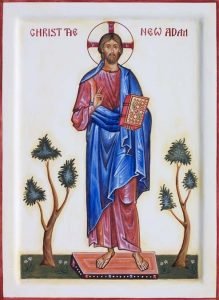 In Eastern Christian spirituality, as expressed by the Greek Fathers, the human being as a person is of decisive importance. This does not mean that Christian spirituality is individualistic. The human person is always seen in a social context. It is the person together with neighbors who is the subject of Christian spirituality. This also means that both anthropology and ecclesiology, that is the understanding of the human person and the understanding of the church respectively, are interrelated.
In Eastern Christian spirituality, as expressed by the Greek Fathers, the human being as a person is of decisive importance. This does not mean that Christian spirituality is individualistic. The human person is always seen in a social context. It is the person together with neighbors who is the subject of Christian spirituality. This also means that both anthropology and ecclesiology, that is the understanding of the human person and the understanding of the church respectively, are interrelated.
The human being as a person is also always understood as being created in the image of God. The image charac-ter of a person’s being and the image purpose of a person’s existence constitute the characteristics of Christian spirituality. Therefore, the human being as person and God as the co-personal counterpart are seen as the decisive factors in this spirituality. What Martin Buber, from a Jewish point of view, called “the I-Thou relationship” is thus relevant also for Christian thought. The human being as image of the divine reality is never understood merely as a reflecting mirror, but as an individual subject, challenged in freedom by God and responding in action and worshipful recognition – or sinful revolt – to that challenge.
The basis of this Eastern Christian spirituality was laid in the early church. Its authoritative writers and spiritual fathers developed its anthropology into a concise foundation for their reflections on spiritual development. In this context the two concepts of image and person are crucial. The human person is basically understood as a being who is the bearer of an “iconological” purpose in relation to God within the created order, and who is, at the same time, a person, that is, a being who is able to develop a self, which is neither just an individual within a species nor a disloyal resistance center within a given order. The concepts of image and person, as a matter of fact, belong together. Divine life is understood as personal. God is divinity in three persons – and thus the human being, as bearing the image of God, is necessarily a person.
As you can see, our dogmas have a direct impact on our understanding of ourselves and God and the purpose of creation. We must begin to see ourselves as the image of God – the living icons of God incarnate, Jesus.
